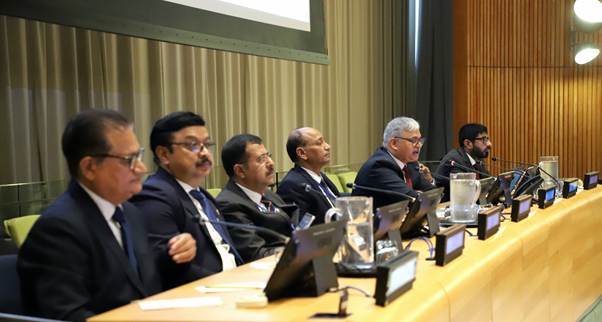20th Session of the United Nations Forum on Forests (UNFF20)

- 13 May 2025
In News:
India actively participated in the 20th session of the United Nations Forum on Forests (UNFF20) held from May 5 to 9, 2025, at the United Nations Headquarters, New York. UNFF, established in 2000 by the UN Economic and Social Council (ECOSOC), is the sole intergovernmental platform dedicated to global forest policy dialogue and coordination, aiming to promote sustainable forest management (SFM) and strengthen political commitment worldwide.
Key Objectives and Functions of UNFF
- Promotes conservation, management, and sustainable development of all forest types.
- Supports the implementation of Agenda 21, Rio Forest Principles, and the UN Strategic Plan for Forests 2017–2030.
- Oversees six voluntary Global Forest Goals (GFGs) and 26 targets, including reversing deforestation and enhancing forest governance.
- Facilitates cooperation through technical exchanges, policy development, financing mechanisms like the Global Forest Financing Facilitation Network, and advocacy linking forests with climate, biodiversity, and sustainable development.
India’s Highlights at UNFF20
India reaffirmed its commitment to the Voluntary National Contributions (VNCs) under the UN Strategic Plan for Forests 2017–2030, reporting progress in increasing its forest and tree cover, which now constitutes 25.17% of the country’s geographical area, as per the latest India State of Forest Report. Major achievements include:
- Restoration efforts under the Aravalli Green Wall project.
- A 7.86% increase in mangrove cover over the past decade.
- Afforestation of over 1.55 lakh hectares through the Green India Mission.
- Plantation of 1.4 billion seedlings under the “Ek Ped MaaKe Naam” (Plant4Mother) campaign.
Global Contributions and Initiatives
India extended an invitation to all UN member states to join the International Big Cat Alliance (IBCA)—a global platform launched by India to conserve seven big cat species through collaborative research, knowledge exchange, and capacity-building.
India also emphasized the importance of incorporating the outcomes of the Country-Led Initiative (CLI) on forest fire management and forest certification—hosted by India in Dehradun in October 2023—into formal global mechanisms. It acknowledged contributions from other countries such as the Republic of Congo, Democratic People’s Republic of Korea, and Austria in this initiative.
Policy and Technical Engagements
India hosted a side event titled “Restoring Degraded Forest Landscapes: India’s Approach to Sustainable Forest Management and Climate Resilience”, showcasing integrated forest restoration strategies combining policy innovation, resource convergence, community participation, and technology.
In a high-level panel on “Valuing Forest Ecosystems in National Policy and Strategy,” India shared pilot study findings from Uttarakhand, Rajasthan, and tiger reserves that quantified ecosystem services like carbon sequestration, water provisioning, and biodiversity conservation. India stressed the need to incorporate ecosystem valuation into national planning to enhance forest governance and ecological sustainability.
Significance of UNFF20
The session focused on advancing three Global Forest Goals:
- Reversing forest cover loss.
- Increasing protected and sustainably managed forests.
- Promoting forest governance and legal frameworks.
UNFF20 aimed to strengthen global dialogue following the 2024 midterm review of the international arrangement on forests and set the agenda for future policy deliberations in 2026. It underscored the critical role forests play in climate resilience, biodiversity, livelihoods, and sustainable development.
